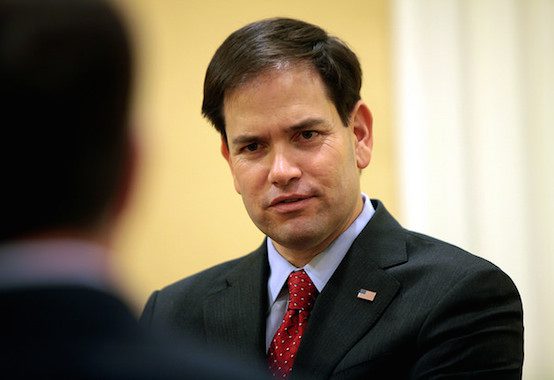Rubio’s Weirdly Lazy Campaign for President

The Boston Globe reports on Rubio’s lackadaisical organizing in New Hampshire:
As Senator Marco Rubio has climbed the polls, the Floridian lacks one element that has proved to be pivotal for previous winners of New Hampshire’s presidential primary: a robust ground game that can generate enthusiasm and support when voters go to the polls.
On Tuesday, Rubio and a super PAC supporting his candidacy started an onslaught of 1,900 television advertisements — approximately $2.8 million worth — on the state’s top station. But underneath the buzz, GOP activists in New Hampshire are grumbling that Rubio has fewer staff members and endorsements than most of his main rivals and has made fewer campaign appearances in the state, where voters are accustomed to face-to-face contact with presidential contenders.
As we saw last week, this isn’t a problem for Rubio just in New Hampshire, but is representative of the overall weakness of his campaign. Because Rubio hasn’t been able to raise much money, he hasn’t been able to build the sort of campaign organization that winning candidates typically have, but he also isn’t barnstorming the early states as long-shot candidates with few resources have to do in order to compete. He is taking his support for granted, and he doesn’t seem to be working very hard at winning over new supporters. If he were busily stumping all the time to make up for the lack of resources, he wouldn’t be accused of neglecting the early contests, but for whatever reason he isn’t doing that, either. As the report states, ten other candidates have spent more days in New Hampshire than he has (and he ties Scott Walker for eleventh place). It’s conceivable that he could end up behind most of them when the votes are finally counted in February.
The Union-Leader recently criticized Rubio’s approach to their state in a recent editorial:
But one of the great benefits of the New Hampshire primary is that it makes the candidates better. The person-to-person grassroots campaigning we expect breaks future Presidents out of the bubble of prepared speeches, staged debates, and shallow television interviews. And so far, Rubio seems to be just going through the motions.
In fairness, the paper has already inexplicably endorsed Christie, but at least Christie is spending the time one would expect a presidential candidate to spend there. Christie has reportedly been in New Hampshire more than four times as often as Rubio has, and he’s using this to mock Rubio. Christie’s chances of winning the nomination are even worse than Rubio’s, but he’s making the effort that Rubio so far can’t seem to be bothered to make.
His absence from the state is hurting him, but it doesn’t help that his campaign isn’t there to pick up the slack:
A review by the Globe found that Rubio’s staff remains small compared to other top campaigns. He has seven paid aides in New Hampshire — a size more in line with what struggling candidates have [bold mine-DL].
Then again, perhaps the conclusion to draw from all this is that Rubio’s campaign is one of these struggling campaigns and has been all along. If everyone thought of Rubio as a long-shot contender with little realistic chance at the nomination, none of this would be surprising, but he has been built up into a “top-tier” candidate for so long as that it is news when his campaign isn’t doing all that well. Rubio is proving to be a candidate who is not only being out-organized, but also out-hustled. The senator likes to excuse his Senate absenteeism by referring to his presidential campaigning, but in light of these reports it’s fair to ask: what is Rubio doing during all the time he’s not spending doing his job?